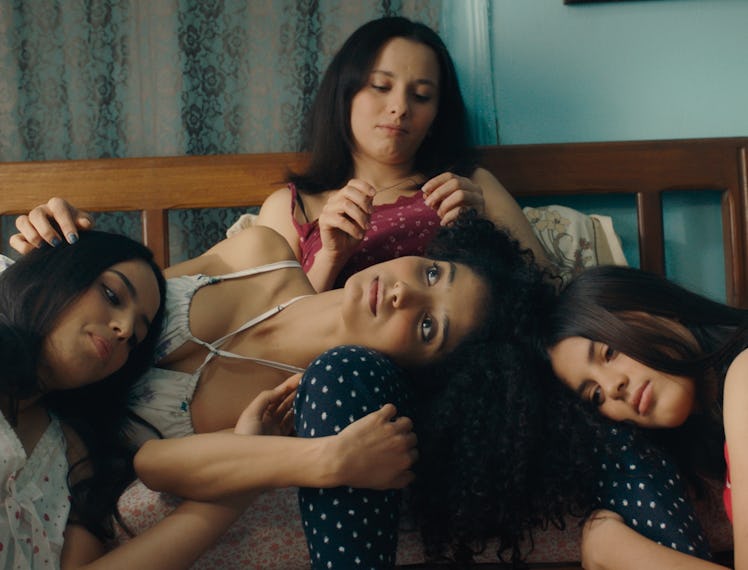Four Daughters Offers Healing to a Tunisian Family Fractured by ISIS
The Oscar-nominated documentary combines actor reenactments with candid interviews from a family whose children were radicalized by the Islamic State.

The saga of Olfa Hamrouni and her children can sound like a nightmare: her daughters, Ghofrane and Rahma, were radicalized by ISIS and left their family behind, seemingly forever. Their story unfolded during the extremist upheaval in Tunisia following the Arab Spring, leaving Olfa and her two younger daughters, Eya and Tayssir, to pick up the pieces. Tunisia’s revolution in 2011 made possible new elections with moderate political parties, but Olfa soon noticed her older daughters attending gatherings by a local preacher, and then taking up increasingly extreme views. Two years after that, first Ghofrane and then Rahma ran away to join ISIS.
Olfa spoke out about her family’s trauma in 2016, but Four Daughters—nominated for this year’s Academy Award for Best Documentary and already a winner at 2023’s Cannes and the Gotham Awards—delves into the history with what its director, Kaouther Ben Hania, calls “kaleidoscopic” storytelling. The movie’s engrossing method combines candid interviews with actor reenactments of scenes from the family’s lives—and sometimes a medley of the two. We’ll see a reenactment of an argument with a commentary from now-teenaged Olfa or Tayssir about the emotions it brought up, or the family’s reactions when meeting the actors newly cast as Ghofrane and Rahma. Olfa (who’s played by Egyptian-Tunisian actress Hend Sabry) proves to be a complex figure all by herself—a formidable mother who rebelled against the traditional expectations of her marriage but also seems to buy into patriarchal restrictions on Eya and Tayssir.
“As a filmmaker, my job is to understand complexity and then construct it in a coherent way for audiences. You can’t have those relationships with this authenticity in fiction,” Ben Hania told me. “I didn’t choose this form because it’s cool or edgy or something.”
She started by filming a long interview with Olfa and her daughters as a base to the storytelling around their sisters’ disappearance from their lives. After that, “the main idea was to film a memory per day.” She’d ask a family member to describe what happened, then play it out with the actors. “Nothing is scripted, so sometimes we found ourselves in another new memory.” Four Daughters keeps digging into the family’s experiences beyond the trauma of losing Ghofrane and Rahma: Olga talks about taking a lover when the revolution happened, calling it a kind of personal revolution, but then in a wrenching scene, Tayssir opens up about being abused by her mother’s partner. Other times, Tayssir and Eya and the actors are just hanging out, with Olga popping her head in the door to weigh in.
Ben Hania believes adolescence is an essential and familiar part of their story—a battle of wills, but in a cauldron of incendiary politics and relentless social pressures. “My characters are not an exception! When you are a teenager, you want to have your personality, you want to piss off your parents,” the director said. In the film, we learn that Rahma went through a Goth period before getting inculcated by ISIS, which the film includes not to make a connection but to show the daughters’ exploration of identity. “What fascinates me is this very fragile moment where you are constructing yourself and you can easily make mistakes,” Ben Hania added. “You want to prove things to yourself. And your relationship with death is crazy.”
Ben Hania believes the film might have helped connect Olfa to her daughters in new ways. “I felt that for the first time, she changed her perspective and was almost discovering the beauty of her girls,” she said. The movie also makes viewers wonder where the younger two daughters go from here—especially Tayssir, who was no more than eight years old when her sisters left. As the film relives the family’s past, Tayssir especially becomes our window to the immediacy of their memories, opening her heart. “When I put the camera on her face, it’s just magic,” Ben Hania said of the sister. “She’s so expressive, so natural.”
If that sounds like a director talking about one of her actors, that’s true to Ben Hania’s hybrid approach. She’s very aware that, though she’s recounting true events, she’s also creating something new on screen. “In real life, you don’t have actors coming to play your memories. So I’m setting everything up: I thought about the colors, the costumes, the set, all those elements.” Ben Hania filmed Four Daughters in an old hotel in Tunis, with a women-dominated crew, and she points to a range of hybrid influences that also use reenactment: Joshua Oppenheimer’s The Act of Killing, Robert Greene’s Procession, Mohsen Makhmalbaf’s A Moment of Innocence.
Four Daughters originally opened last fall but keeps touring the country, including recent runs at Nitehawk in New York (it’s also available to rent on Amazon Prime). Ben Hania has stayed engaged with the sisters’ story, lobbying on behalf of Ghofrane’s young daughter. For her, getting their story out was not about streamlining or simplifying things for an audience. “We become stupid when we reduce things or label things,” she said. “Authenticity is something that touches us and we don't know why. It reminds us of something that we know deeply, like a universal truth. So it can be fiction, it can be documentary, it can be shaky, it can be nicely done. But if it makes us feel this way, for me, it’s authentic.”